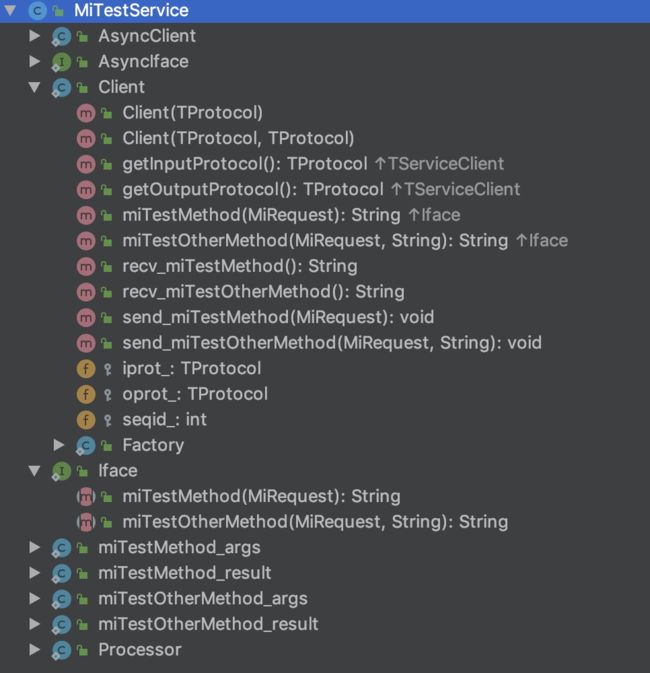本篇分两块来介绍thrift协议。
thrift定义文件:
struct MiRequest {
2: required string name;
3: optional i32 age;
}
exception MiRequestException {
1: required i32 code;
2: optional string reason;
}
service MiTestService {
string miTestMethod(1: MiRequest request) throws (1:MiRequestException qe);
string miTestOtherMethod(1: MiRequest request, 2: string pTwo) throws (1:MiRequestException qe);
}
执行thrift --gen java:beans Test.thrift
生成MiTestService.java,本篇后文的通信协议介绍都是基于MiTestService.java,类结构如下:
简介:
MiTestService.AsyncClient:异步调用-调用方协议处理类
MiTestService.AsyncIface:异步调用-接口定义
MiTestService.Client:同步调用-调用方协议处理类
MiTestService.Iface:同步调用-接口定义
MiTestService.miTestMethod_args:方法miTestMethod的入参
MiTestService.miTestMethod_result:方法miTestMethod的返回值
MiTestService.miTestOtherMethod_args:方法miTestOtherMethod的入参
MiTestService.miTestOtherMethod_result:方法miTestOtherMethod的返回值
MiTestService.Processor:服务方协议处理器
以同步远程调用miTestOtherMethod方法为例:
一、调用方--方法调用和消息发送
MiTestService.Client构造方法
public Client(TProtocol prot)
{
this(prot, prot);
}
public Client(TProtocol iprot, TProtocol oprot)
{
iprot_ = iprot;
oprot_ = oprot;
}
TProtocol为底层通信处理类。
备注:
MiTestService.Client协议处理类:负责通信协议消息体的定义,消息体的发送和二进制流的解析
TProtocol通信处理类:负责处理二进制字节流的发送和接收
调用方发起方法调用:MiTestService.Client.miTestOtherMethod
public String miTestOtherMethod(MiRequest request, String pTwo) throws MiRequestException, TException
{
send_miTestOtherMethod(request, pTwo);
return recv_miTestOtherMethod();
}
public void send_miTestOtherMethod(MiRequest request, String pTwo) throws TException
{
oprot_.writeMessageBegin(new TMessage("miTestOtherMethod", TMessageType.CALL, ++seqid_));
miTestOtherMethod_args args = new miTestOtherMethod_args();
args.setRequest(request);
args.setPTwo(pTwo);
args.write(oprot_);
oprot_.writeMessageEnd();
oprot_.getTransport().flush();
}
重点说明:
TProtocol.writeMessageBegin发送TMessage指定本次调用的是哪个方法
miTestOtherMethod_args.write发送本次方法调用的入参
两块的详细源码和说明如下:
public void writeMessageBegin(TMessage message) throws TException {
if (strictWrite_) {
int version = VERSION_1 | message.type;
writeI32(version);
writeString(message.name);
writeI32(message.seqid);
} else {
writeString(message.name);
writeByte(message.type);
writeI32(message.seqid);
}
}
public void write(TProtocol oprot) throws TException {
validate();
//空实现
oprot.writeStructBegin(STRUCT_DESC);
//发送入参:复合对象request
if (this.request != null) {
//REQUEST_FIELD_DESC = new TField("request", TType.STRUCT, (short)1);
//写入TField.type、TField.id
oprot.writeFieldBegin(REQUEST_FIELD_DESC);
//写入具体内容
this.request.write(oprot);
//空实现
oprot.writeFieldEnd();
}
//发送入参:基础类型string
if (this.pTwo != null) {
//P_TWO_FIELD_DESC = new TField("pTwo", TType.STRING, (short)2);
//写入TField.type、TField.id
oprot.writeFieldBegin(P_TWO_FIELD_DESC);
//写入具体内容
oprot.writeString(this.pTwo);
//空实现
oprot.writeFieldEnd();
}
//写入一个字节:TType.STOP(整型1)
oprot.writeFieldStop();
//空实现
oprot.writeStructEnd();
}
远程调用请求信息发送完毕。
二、服务方--消息接收和解析
MiTestService.Processor构造方法:传入MiTestService.Iface的具体实现类
public Processor(Iface iface)
{
iface_ = iface;
//方法名-方法处理类映射,每个方法生成了一个具体的处理类
//可以看出方法名称必须唯一,不支持方法重载
//方法处理类实现了MiTestService.Processor.ProcessFunction接口
processMap_.put("miTestMethod", new miTestMethod());
processMap_.put("miTestOtherMethod", new miTestOtherMethod());
}
protected static interface ProcessFunction {
public void process(int seqid, TProtocol iprot, TProtocol oprot) throws TException;
}
//private class miTestMethod implements ProcessFunction
//private class miTestOtherMethod implements ProcessFunction
服务方调用TServer.serve开启端口监听,
接收到消息后将调用MiTestService.Processor.process方法
public boolean process(TProtocol iprot, TProtocol oprot) throws TException
{
//解析出TMessage消息,主要包含请求调用的方法名称
TMessage msg = iprot.readMessageBegin();
//
ProcessFunction fn = processMap_.get(msg.name);
fn.process(msg.seqid, iprot, oprot);
return true;
}
以miTestOtherMethod处理流程为例,主要代码如下:
public void process(int seqid, TProtocol iprot, TProtocol oprot) throws TException
{
//解析参数
miTestOtherMethod_args args = new miTestOtherMethod_args();
//此处划重点:涉及第三部分可扩展性的讲解
args.read(iprot);
//空实现
iprot.readMessageEnd();
//结果对象
miTestOtherMethod_result result = new miTestOtherMethod_result();
//发起方法调用
result.success = iface_.miTestOtherMethod(args.request, args.pTwo);
//调用结果写回
oprot.writeMessageBegin(new TMessage("miTestOtherMethod", TMessageType.REPLY, seqid));
result.write(oprot);
//空实现
oprot.writeMessageEnd();
oprot.getTransport().flush();
}
三、thrift协议--字节码增强、skywalking可扩展消息头
第三部分将根据miTestOtherMethod_args.read方法的具体实现,
来解读thrift协议的可扩展消息头的实现原理
public void read(TProtocol iprot) throws TException {
TField field;
//非读--空实现
iprot.readStructBegin();
while (true)
{
//读取Field.type、Field.id
field = iprot.readFieldBegin();
if (field.type == TType.STOP) {
break;
}
//根据Field.id匹配关系,解析出每一个方法入参
switch (field.id) {
case 1: // REQUEST
if (field.type == TType.STRUCT) {
this.request = new MiRequest();
this.request.read(iprot);
} else {
TProtocolUtil.skip(iprot, field.type);
}
break;
case 2: // P_TWO
if (field.type == TType.STRING) {
this.pTwo = iprot.readString();
} else {
TProtocolUtil.skip(iprot, field.type);
}
break;
//匹配不上的消息则跳过
default:
TProtocolUtil.skip(iprot, field.type);
}
iprot.readFieldEnd();
}
//空实现
iprot.readStructEnd();
validate();
}
由上面的服务方方法参数解析实现可以得出:
1、每一个方法的方法入参都严格按照定义的Filed.id来匹配
2、匹配失败则走到default逻辑,跳过匹配异常的消息体
由此可以实现:
字节码增强TBinaryProtocol.writeMessageBegin,在此方法执行后延(即写入TMessage后)写入自定义Field.id的消息体;
字节码增强TBinaryProtocol.readMessageBegin 或者 MiTestService.Processor.process,在字节流解析出TMessage后解析自定义Field.id的消息体。
自定义消息体可以为任何自定义类型的thrift复合类型或基础类型,传入skywalking上下文信息。
